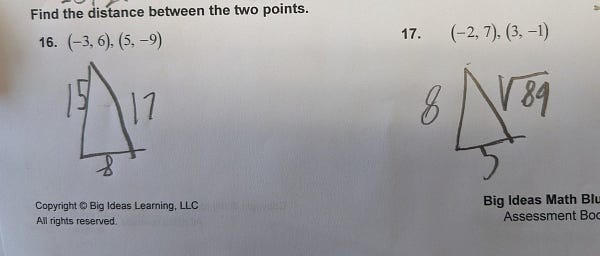This last week, Nick Corley showed us all again why Twitter—in spite of everything—is still unmatched for on-demand internet-based professional learning.


Nick posed a teaching dilemma which elicited ~100 replies on Twitter, a couple of responses off of Twitter (including the one you’re reading), and saw several of the replies spin off lengthy conversations of their own. (Like this one about students who are reluctant to show their work.)
So first thing: I wanted to marvel with you at that professional learning experience.
Second, I wanted to offer a response to Nick’s question, which is that, if you have to ask the question, “should I give full credit?” the answer is almost always “yes.”
This is simply an application of Blackstone’s 18th century legal doctrine to math class: “it is better that ten students get full credit who don’t deserve it, than one student who deserves full credit doesn’t.”
Look at this count of Google results and tell me we should do otherwise.
Loads more students feel bad at math than other disciplines—or at least they’re more inclined to write about it on the internet.
I’ll wager that if we asked students which of their classes feels most concerned with rightness and wrongness, most concerned with precision, and least concerned with their personal subjectivity, the majority of them would name “math.”
It’ll be the project of multiple lifetimes to undo those perceptions. And by giving Nick’s student less than full credit, we’d be communicating that, “Not only must you find the correct answer, you must find it in the correct way.” It’s too much, and I encourage us to risk letting the guilty go free in these situations.
BTW
As an exercise for the reader, what would an assessment item look like that more explicitly looked into a student’s understanding of the distance formula?
If you’re interested in hanging with me and learning more about the kinds of curriculum and instruction we’ve been developing at Amplify, I and some of my buddies are offering a webinar series that kicks off this next week.



![A graph of "Why am I bad at [x]?" where x is science, history, english, and math. Math is up at > 2500 results while the others are <= 10. A graph of "Why am I bad at [x]?" where x is science, history, english, and math. Math is up at > 2500 results while the others are <= 10.](https://substackcdn.com/image/fetch/$s_!nqJC!,w_1456,c_limit,f_auto,q_auto:good,fl_progressive:steep/https%3A%2F%2Fsubstack-post-media.s3.amazonaws.com%2Fpublic%2Fimages%2F4191c58d-02eb-430a-9103-7c929c07bd92_1600x900.png)
Great work on the student's part. I would give 90%, withholding the 10% for missing explanation. Communication is important.
"if we asked students which of their classes feels most concerned with rightness and wrongness, most concerned with precision, and least concerned with their personal subjectivity," then I hope to god most of them answer math. why would we want to undo this? Why do you associate requiring students to do it the right way with the idea that getting to the right answer is important? this seems quite a logical fallacy.